The new Netflix show 3% opens with a title card: “The world is divided into two sides: one abundant, the other scarce. A selection process lies between them. At the age of 20, each person has one chance. The chosen ones never return. They are the 3%.”
We then open on a close up of a young girl’s face, as she stares at a brightly-colored wall riddled with crossed-out numbers. She turns to look at the picture of a young man and then heads out into the streets, thronged with people heading to the same place as her: the Selection Facility, a modern, bright-white building on the top of a hill.
It’s a compelling opening to one of Netflix’s newest shows, produced and set in Brazil. Despite some behind-the-scenes controversy — the leaking of a racist email from the casting department — the show features a diverse and dynamic cast, and its popularity has already won it renewal for a second season.
It’s the sort of show that could easily fall into young adult dystopian tropes. But so far 3% is a fast-paced and insightful show, filled with potentially fascinating social commentary and a vibrant cast of characters.
Warning: the recaps contain spoilers for the first two episodes of 3%. But we tried to keep them out of the analysis!

Episode 1: Cubes
“Cubes” opens with the focus split between our young candidates getting ready for this year’s Process and the Process organizers themselves. Ezequiel has been the head of The Process over the past few years, but this time he’s got company: Aline is there to evaluate his work. A person was murdered Offshore, so questions are being raised about the effectiveness of the Process. But Ezequiel doesn’t care and he’s certain that Aline has a political agenda of her own. Aside from those political tensions, there’s also a resistance group that wants to dismantle the Process — the Cause. The Process team captures and tortures an agent of the Cause, thus discovering that there’s a mole among the candidates.
The first stage in The Process is an individual interview where we learn a little more about the candidates, like the fact that Joana is too cool for this shit or that Marco’s family always succeeds in The Process so the same is expected from him. More than the heroes, this stage already shows us the ruthlessness of The Process and what they’re looking for in a candidate. If the audience had any question as to how important this single chance is, one of the eliminated candidates kills himself in front of the remaining ones. Ouch.
The second stage are the cubes that name the episode. Divided in small groups, each candidate must assemble pieces into at least nine cubes or face elimination. Michele helps the disabled Fernando reach the cube pieces and in return he saves her from elimination by merging her eight cubes into a ninth one. Rafael steals another candidate’s cube to pass the test and Joana surprises everybody by making eleven cubes instead of just nine. The Process is ruthless indeed, but so are the candidates.
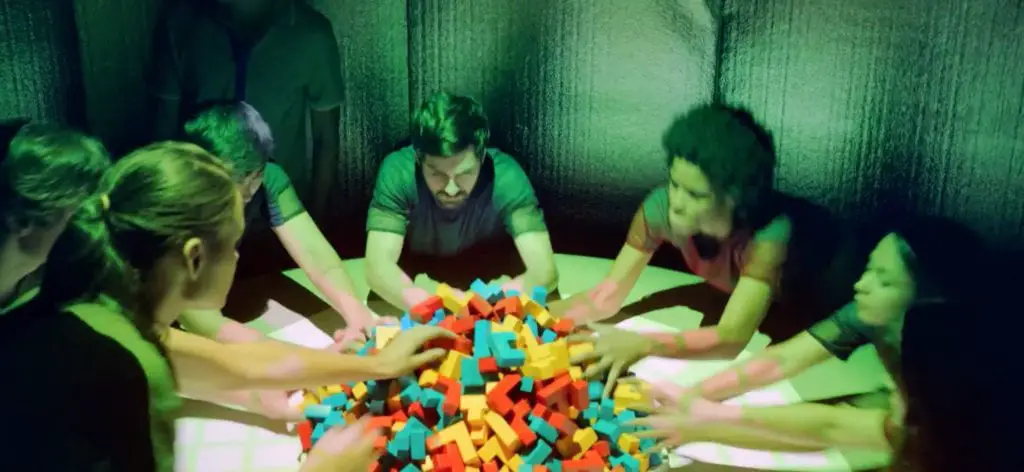
Rafael’s actions leave a bad impression on the remaining candidates, but he claims they all will have to be like him sooner or later and if they were so righteous they would have done something when he cheated. The crowd doesn’t buy it and a lot of people beat the shit out of Rafael until Marco intercedes. Joana then approaches him to propose a partnership — that he can’t really deny, because she noticed Rafael entered the Process using a fake id.
The Process organizers get another clue on the mole’s identity, leading them to Michele and her neighbour Bruna. The girls are taken to a shady facility and both will die if the interrogator can’t find out who’s the mole. Michele comes up with a plan to attack the interrogator, but she betrays Bruna in the last second, as flashbacks reveal she’s the mole. Poor Bruna lies dead on the floor and Michele goes back to the Process, filled with guilt but determined to accomplish her mission.
Episode 2: Coins
As the candidates go through a medical evaluation, we get glimpses of Fernando’s backstory: since he was a child, already in a wheelchair, he dreamed about being a part of the chosen 3%. His father was a preacher with a blind faith in the Process and no doubt this was passed to his son. In the present time, Fernando learns there’s a treatment available Offshore that can allow him to walk again, as long as he passes the Process. He seems shaken by the idea, but more on that later.
We reach the first group assignment in The Process: a small group of candidates has to figure out what happened in a staged scene, and the wrong answer will eliminate all of them. Fernando comes up with a good theory, but that is soon debunked by Rafael. Rafael’s theory, with a key help from Joana, is reluctantly accepted by the whole group. They were right, and the group advances.
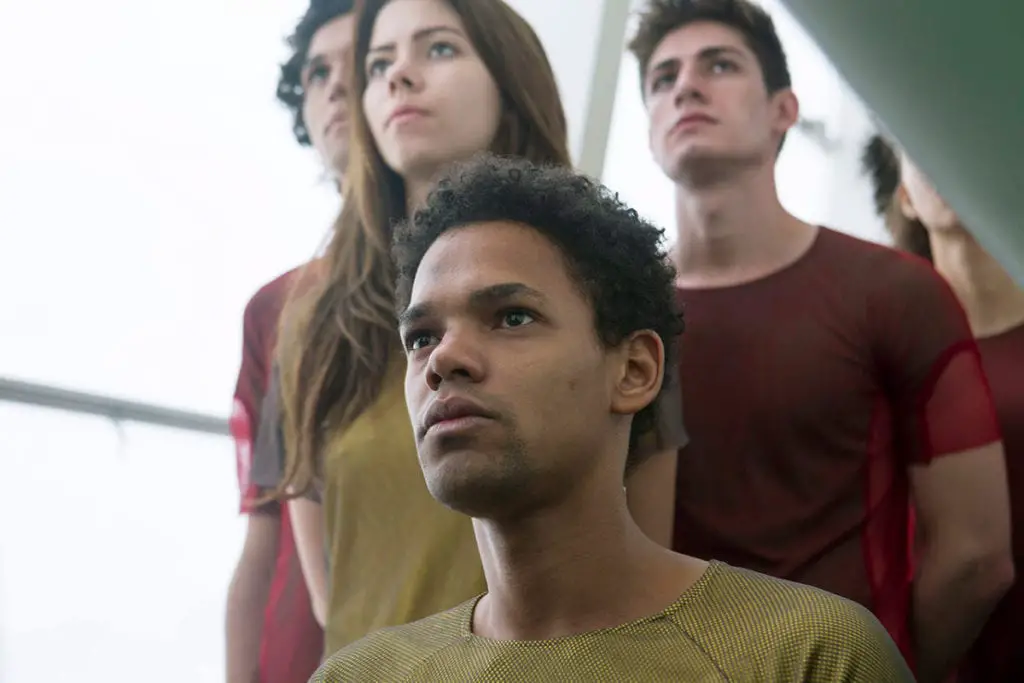
After being taunted by Rafael for the previous task, Fernando tells Michele about the treatment available Offshore. She’s ecstatic, until he says he doesn’t want to: he spent years trying to accept himself the way he is and now he does, he doesn’t wanna walk and that’s not why he’s here. Michele is surprised by this but accepting, and it’s a nice moment for both characters (and for the nuanced treatment of disabled characters on screen).
For the next stage, the same small group from before is locked in a cell with a bag of coins and whoever doesn’t have one by the end of the test will be eliminated. The group decides to vote who this person will be and Rafael chooses Fernando, for all the ableist reasons you can expect. Fernando tells them about the treatment that can make him walk again and they decide to draw names instead. Joana loses seemingly on purpose, but as the candidates exit the cell we learn her plan: she stole a coin in the very beginning of the test, leaving a baffled Lucas behind to be eliminated. The rest of the group is shocked to see her back.
Later we see Fernando angry at himself for playing the Woobie Card, because that’s not who he is. Michele says he shouldn’t be angry at himself, but at The Process and its organizers. Fernando believes in The Process wholeheartedly and the dissonance of their personal beliefs is obvious. Will they be obvious enough to make Fernando suspect Michele is a mole?
Meanwhile, Ezequiel told Aline he wouldn’t be around for the coin test and she smelled bullshit. Following several security cameras, Aline discovers he regularly leaves The Process’ facilities to go Inland in disguise. She still has no idea what he’s doing there and neither do we, but apparently there’s more to Ezequiel than just being The Process’ poster boy.
Dystopias & Expectations
Priscilla: At first I was divided whether or not to watch the show. Like many Brazilians, I tend to be biased against our own fiction — blame the soap operas and free-to-air TV channels if you will, but also the barriers many interesting pieces face before reaching the public. Genre fiction is especially rare here, so when this kind of work is finally produced it carries the weight and expectations of too many untold stories. It’s a cruel position to hold!
On the other hand, precisely because Brazilian genre fiction is so rare I was curious to check how this one turned out. Plus I’m a sucker for dystopias and I enjoyed the premise of 3%, though I must say the trailer doesn’t do the show justice. I feared the acting would be too stiff and the setting too generic, and I’m happy to say I was wrong.
The premise of the show was nicely executed so far, with interesting characters and subplots that have me curious for the following episodes. The show does an incredible job in establishing its characters and worldbuilding without being too vague or too infodump-y. It tells you exactly what you need to know and in a way that feels organic to the story.
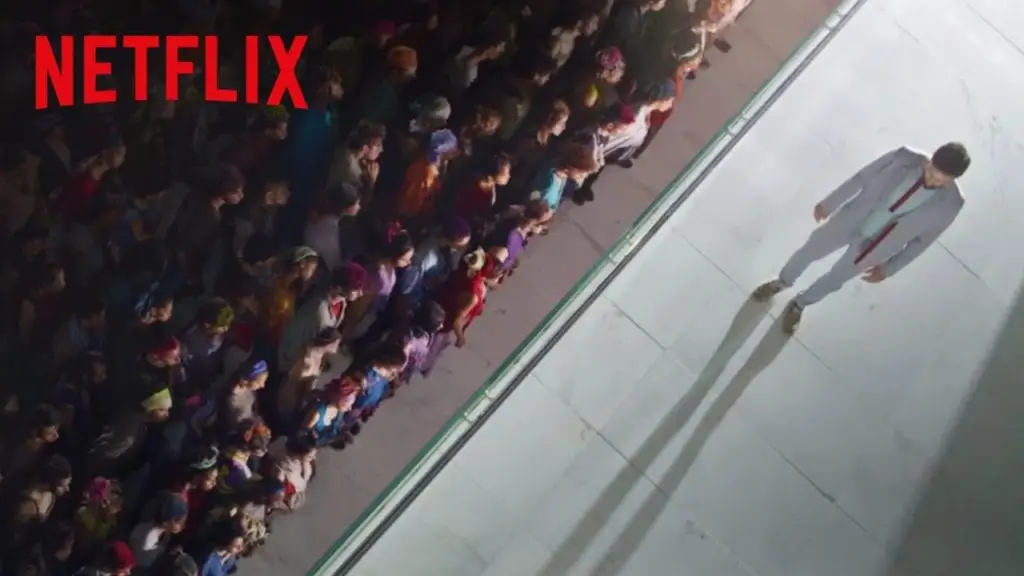
Katie: Yes! Agreed on almost all of that. I was a little worried going into 3% — I’m a little burnt out on young adult dystopian stories. I’m sure there are some great ones out there! But I’m tired of a young, brunette, not-like-other-girls protagonist utilizing her Specialness to fight off a system that usually doesn’t make a whole lot of sense. There’s a tendency for the worldbuilding in these stories to manage to be complicated and nonsensical at the same time, and it’s almost been enough to make me tune out the whole genre.
And when I first started watching, I thought 3% was going fit into this pattern pretty snugly. Michele, the first character we see, is a young, pretty brunette being thrown into an apparently unjust sorting system. The selection is just called The Process. The people fighting against it are The Cause. The world is portrayed as poor and disheveled; the selection facility is gleaming white walls, advanced technology, and lots of food.
But almost immediately, 3% feels like its own story. It’s never really a collection of tropes. A lot of it is because the world building is not very complicated… and it’s not very far away from contemporary reality. I think it has a lot of potential to engage in some really interesting social commentary.
Characters & Tropes
Katie: It’s really amazing to me how much character development has occurred in 3% after only two episodes. At this point we have at least seven central characters, and none of them feel underserved. It would be so easy to boil each character down to a central defining trait and leave it at that — Fernando is the wheelchair guy, Michele is the girl with a secret, Ezequiel is the bad guy in charge of running the Process, etc. But it never really happens.
Priscilla: I agree completely. Ezequiel is an interesting case, because so far he’s been the poster boy for The Process, but there are subtle hints that there’s more to him — like the mentions of his wife or his Inland incursions. I like that, because it prevents him from being too one-dimensional without actually revealing too much from the start. Yet I feel he does believe in his work, which is important for an antagonist, especially in a dystopia.
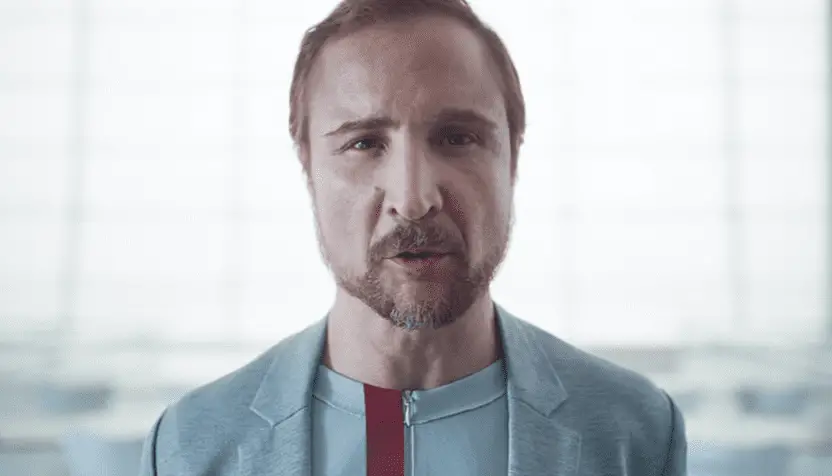
Katie: Yes! I love the point about him believing in his work. It sets him up as a nice foil to Michele, who is also doing some questionable things for the things she deeply believes in. And yeah — Ezequiel is the “architect” of the Process, and it would be easy to turn him into an arrogant megalomaniac. And he is that! Definitely. But the way his character is written and performed, he nearly always seems frenetic, stressed out, and on the verge of cracking. It doesn’t quite make him sympathetic, but it does make him layered interesting character rather than a simple bad guy.
Priscilla: I also liked the treatment of Fernando, though as able-bodied myself I’m not the best person to judge the writing of a disabled character. I’m glad they didn’t use “healing” as his goal and motivation, this would have sent a very ableist message. Instead they have a disabled character that, despite his struggles, doesn’t wish to be able-bodied. Michele’s reaction was well played too, because able-bodied people tend to believe disabled people want to be just like them. So you have a character that owns this identity, but at the same time is more than his disability.
Katie: Agreed again. Fernando is one of the moral centers of the show in a lot of ways — he’s so far been an unfailingly good person. He’s also been in a wheelchair since a young age. It would be an obvious (and rather insensitive) choice to have him want to pass the Process in order to “fix” himself and be able to walk again. In this story he’d be faced with the dilemma of how to balance what he wants with trying to remain a good person; an easy and somewhat lazy story, and one that so easily slips into nihilism when writers want to prove they’re “edgy.” Instead, we get a much more interesting story: when he’s offered the opportunity — should he pass the Process — to get out of his chair, he’s not sure he wants to. It’s become part of his identity, a part he’s not sure he wants to give up. And Fernando’s kindness is never really in question: rather, he’s faced with the question of whether he is willing to use people’s pity for him to advance in the Process. Fernando’s story isn’t a simple conflict. Instead it’s about how he defines himself, and how that definition changes (or doesn’t) when he interacts with other people.
And even beyond that — there’s really not a weak link in the cast of characters. Even Michele, who seems the most generic at first, has a lot of layers to her.
Priscilla: Agreed. The characters are one of the strongest aspects of the show. Dystopias so often focus on setting and social commentary, and 3% doesn’t forget that but is also surprisingly character-driven. It wouldn’t work if the characters were flat or simply more stereotypical, but they all have something that makes them interesting. Even the ones we know less about, like Joana or Marco, don’t feel like cardboards.
It’s also interesting that so far all the candidates had to play less nicely than expected – Rafael is Super Douche Extraordinaire, Joana and Michele advanced their own goals at the expense of other people, Fernando played the Disabled Woobie card even though he didn’t want to… I guess Marco is the only one who hasn’t been in this kind of situation yet. It all helps reinforce how awful the whole Process is, but it never really slides into grimdark.
Katie: Great point. Everyone’s having to compromise themselves in some ways. Marco isn’t that interesting to me yet, but I feel like he’s an important character to have there. I feel like the fact that he has so much privilege is probably part of the reason he hasn’t had to compromise himself yet.
Priscilla: The interesting thing about Marco is that this sort of “family privilege” is very strong here in Brazil — from entire families of doctors and lawyers to people who get away with all sorts of shit just because they have the right family name. His entire family always doing so well in The Process reminded me instantly of that. At the same time, there’s this expectation that he will succeed too, which could be a good conflict for the character.
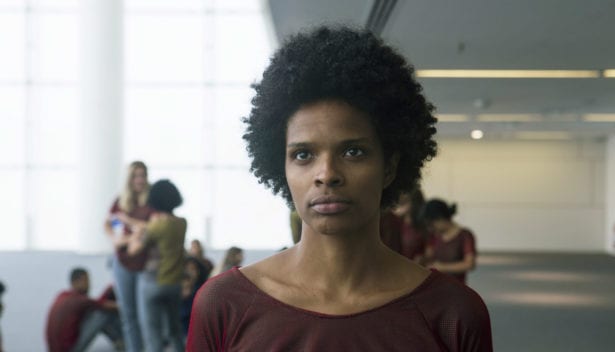
Setting & Pacing
Priscilla: What really got me about those first two episodes is how Brazilian this show is. Not apparently, no: there’s nothing obviously Brazilian about its characters or plot and even the setting is barely mentioned to be Brazil. In that sense, the same show could’ve been produced in another country, with the same plot and the same characters… but it would mean something else entirely.
See, the show explores Brazilian issues in that particular way speculative fiction can explore real life issues without ever naming them as such. A highly unequal society where very few people enjoy the best resources and opportunities is exactly what Brazil is. The idea that those selected few are so privileged because they “earned” it and not because the system is unfair is at the very core of Brazil’s social and political tensions. The speeches that justify the Process — that everybody has the same chance and if you don’t succeed it’s your fault or you didn’t try hard enough — these are the speeches we hear everyday to justify inequality. And it’s not just a speech you hear from people who benefit and perpetuate this system like Ezequiel, but it’s also internalized in good people like Fernando. By playing with this concept, 3% becomes a relevant political show without being obviously political.
Even small details are meaningful for Brazilian eyes, like the torture device used on the captured agent — it’s a pau de arara, commonly used for torture during the recent military dictatorship years. I’m sure this wasn’t a random choice. So the story and characters are universal, but at the same time the show is unabashedly Brazilian. I still don’t know where they’re going with all this, or what themes and messages we can expect from the narrative, but so far I love it!
Katie: I really like that about the show, especially your point about this ideology being internalized in Fernando. It gives the show such a nice extra layer of nuance.
3% is really great to watch from a U.S. viewpoint as well. So much of American media comes from a (largely white and straight) American perspective. It’s so nice to see something else for a change. But I think American audiences will see a lot of themselves in this show too. Maybe it’s just my American need to make EVERYTHING ABOUT US, but the social dynamics at play — though different in the details — will likely feel very familiar to an American audience. The underlying assumption that the successful people in society are deserving of their success (and that struggling people have themselves to blame) is a frequent ideology in a many parts of the world over the last few years. I think this gives 3% the unique position of being a specifically Brazilian story, particularly in the details, but also the potential to be a very universal and timely one. There’s such potential here for really incisive and important criticism.
Priscilla: It’s also refreshing to see such a diverse cast. Brazil’s population is incredibly diverse, but most of our media don’t reflect that. The diverse cast also allows the show to explore other social dynamics that are related to inequality, and I wonder if it will address gender and racial issues like it addresses ableism with Fernando’s story. Not that I enjoy seeing sexism and racism in stories, but it feels a missed opportunity to create a metaphor for inequality in Brazil while ignoring some of the biggest reasons for it. But perhaps that story would be too Brazilian.
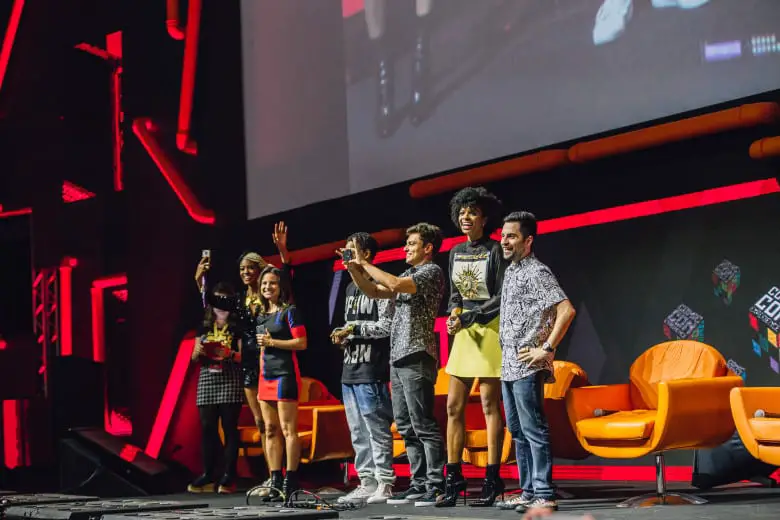
Conclusions
All in all, 3% is off to a really promising start. It has the building blocks (cubes? sorry) in place to create a vibrant and timely story. There are still a lot of questions to be answered. What’s the Offshore? Who or what is the founding couple? What is Ezequiel doing when he’s sneaking out into the city? What’s the history of The Cause? Will our protagonists turn against the Process, or use it to try to improve their own lives? Going forward it’ll be interesting to see how the show reveals more about its characters — we still don’t know exactly what’s driving Joana or Rafael — and its world. Hopefully it will be able to keep up its trend of revealing just the right amount of information as well as balancing the big picture worldbuilding with the personal stories.
[starbox id=”Priscilla,Katie W”]

